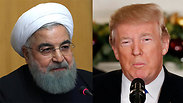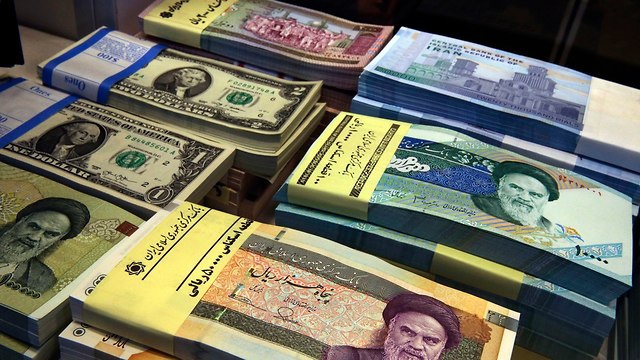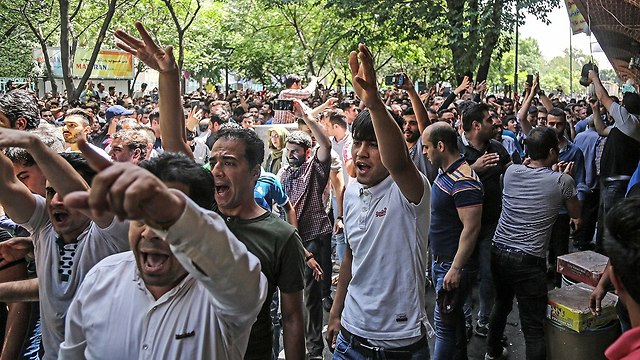
President Rouhani and President Trump
צילום: AFP, AP
Iran: Trump needs to rejoin nuclear deal if he wants talks
Day after US president makes overture to Iranians to discuss new nuclear deal, Iran's semi-official ISNA news agency quotes political adviser Hamid Aboutalebi as saying resolving issues requires ‘those who believe in dialogue’ to ‘be committed to the means’, while reformist lawmaker cautions against negotiating with ‘untrustworthy’ Trump.
Iranian officials reacted skeptically on Tuesday to President Donald Trump's comments that he's willing to negotiate with his Iranian counterpart, saying instead that if Trump wants talks, he needs to rejoin the international nuclear deal he unilaterally pulled out of earlier this year.
Trump on Monday said he'd meet with Iranian President Hassan Rouhani "anytime" if the Iranian leader were willing.
The Iranian leadership has previously ruled out one-on-one talks with Trump, following his decision to pull the United States out of the deal under which Iran was given relief from sanctions in return for curbs on its nuclear program.
Rouhani said on Tuesday the US withdrawal from the nuclear deal was "illegal", and said the ball was "in Europe's court" in terms of maintaining ties with Tehran.
"The Islamic Republic has never sought tension in the region and does not want any trouble in global waterways, but it will not easily give up on its rights to export oil," Rouhani said on his official website.
Iran's semi-official ISNA news agency quoted political adviser Hamid Aboutalebi as saying that for talks to happen, the US needs to rejoin the deal.
"Those who believe in dialogue as a method of resolving disputes in civilized societies should be committed to the means," he said.
Trump withdrew from the landmark nuclear accord in May, saying it was too generous to Iran. He has vowed to ramp up sanctions until Iran radically changes its regional policies, including its support for regional militant groups, something the country's leaders have long refused to do.
Even though Trump on Monday said if Rouhani were to meet with him there would be "no preconditions," he also did not walk back from any of those earlier demands.
With the first US sanctions due to come into effect next Monday, the economy in Iran has already been hit, giving rise to growing fears of prolonged economic suffering.
The Iranian currency has been in freefall, hitting a new low Monday, at 122,000 rial to the dollar on the thriving black market. It recovered slightly to 115,000 to the dollar on Tuesday, and concerns are growing as Iranians have seen their savings dwindle and purchasing power drop.
Heshmatollah Falahatpisheh, the head of influential parliamentary committee on national security and foreign policy, suggested a US return to the nuclear deal, which would bring an end to the economic uncertainty, would be needed before Tehran could think of negotiating.
"There can be no negotiations with the Americans raising the issue of talks from the position of power," he was quoted as saying on the website of the Iranian parliament, calling Trump's decision to pull out of the nuclear deal the "biggest blow to diplomacy."
Reformist lawmaker Mostafa Kavakebian questioned negotiating with Trump, calling him "untrustworthy," and also said now was not the time for talks.
"If this negotiation (is) carried out in any form, then it will be considered as surrender and the Iranian nation will not surrender," he said.
Reuters contributed to this report.












